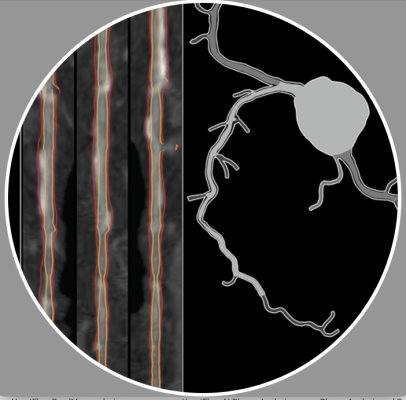
July 18, 2024 — HeartFlow, Inc., a leader in non-invasive artificial intelligence (AI) heart care solutions, introduced the next generation HeartFlow Plaque Analysis with an interactive experience. This upgraded platform is the only plaque analysis tool fully integrated with FFRCT (when FFRCT is performed), delivering impactful insights to enhance clinical decision-making and enabling personalized patient treatment plans. HeartFlow’s Plaque Analysis uses proprietary algorithms to analyze coronary CT angiogram (CCTA) scans, creating a personalized 3D model that quantifies and characterizes plaque volume in the coronary arteries, aiding risk assessment of coronary artery disease. The technology was introduced at the Society of Cardiovascular Computed Tomography (SCCT) Annual Scientific Meeting in Washington, D.C.
“Having access to a patient’s whole coronary picture, with both quantified plaque and physiology, is a game changer as a clinician. I can reference the cross-sectional views with plaque by type when reviewing my patient’s workup and have confidence in the accuracy and actionable insights that I know I’ll get from HeartFlow Plaque Analysis,” said Sarah Rinehart, M.D., F.A.C.C., F.S.C.C.T., medical director of CV imaging, nuclear and CT, Charleston, WV. “With a quantitative measurement of a patient's plaque volume, I can more accurately assess risk and develop a personalized, targeted treatment plan.”
When FFRCT is performed, the new interactive experience integrates highly accurate plaque quantification with lesion specific FFRCT values, showcasing a 3D plaque model and comprehensive plaque analysis by territory across calcified, non-calcified and low attenuation. The platform also offers the ability to view cross-sectional color-coded images of each plaque type where it was quantified along the vessel. This comprehensive view of a patient’s plaque burden enables a personalized treatment, a process that is supported by published prospective data which show:
- HeartFlow Plaque Analysis is the only non-invasive plaque assessment with 95% agreement for total plaque volume measures vs. the gold standard IVUS.1
- Two out of three patients had their medical management changed and more precisely tailored with HeartFlow Plaque Analysis.²
“Accurately diagnosing a patient’s risk for coronary artery disease is critical for determining the best treatment. Our new interactive plaque experience marks an exciting era in AI-enabled cardiac technology, where we are now the only company that offers a fully integrated view of a patient’s true burden of coronary artery disease,” said HeartFlow chief medical officer Campbell Rogers, M.D., F.A.C.C. “The elevated visualization of Plaque Analysis integrated with our flagship FFRCT Analysis, sets HeartFlow apart as a wholistic solution for CT analysis, enabling physicians to enhance personalized treatment decisions.”
HeartFlow’s continued investment and commitment to supporting technologies that enhance diagnostic accuracy and patient care comes on the heels of HeartFlow AI Plaque Analysis achieving a major milestone towards Medicare coverage which should allow for future expanded patient access.
For more information: www.heartflow.com
References:
1. Narula et al. Prospective Deep Learning-based Quantitative Assessment of Coronary Plaque by CT Angiography Compared with Intravascular Ultrasound EHJ 2024.
2. Rinehart et al. JSCAI 2024. https://doi.org/10.1016/j.jscai.2024.101296


 January 28, 2026
January 28, 2026 









